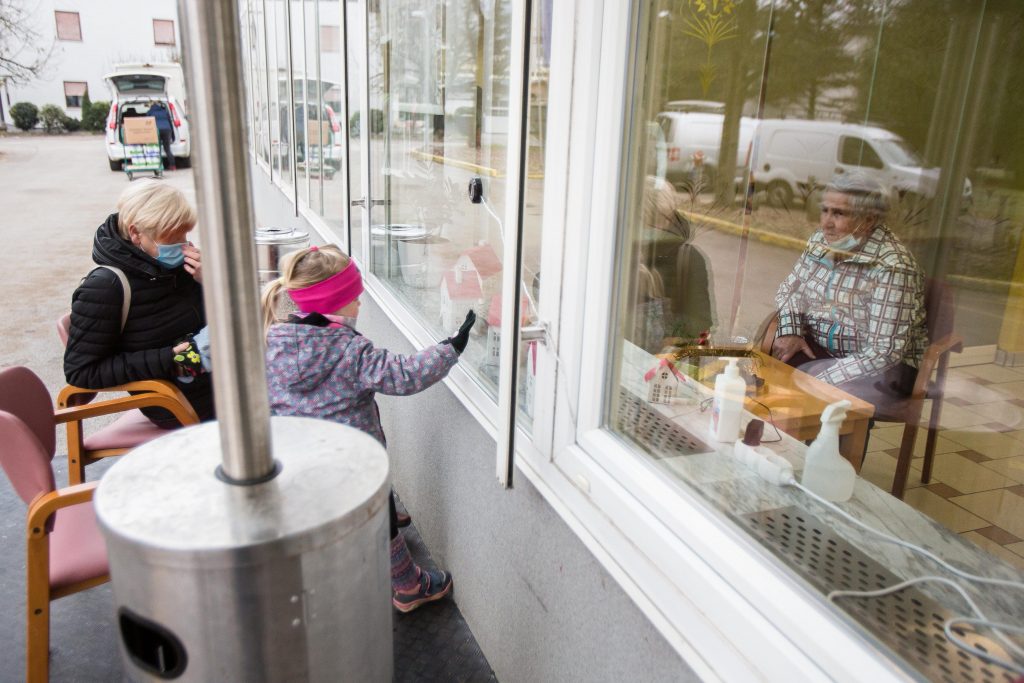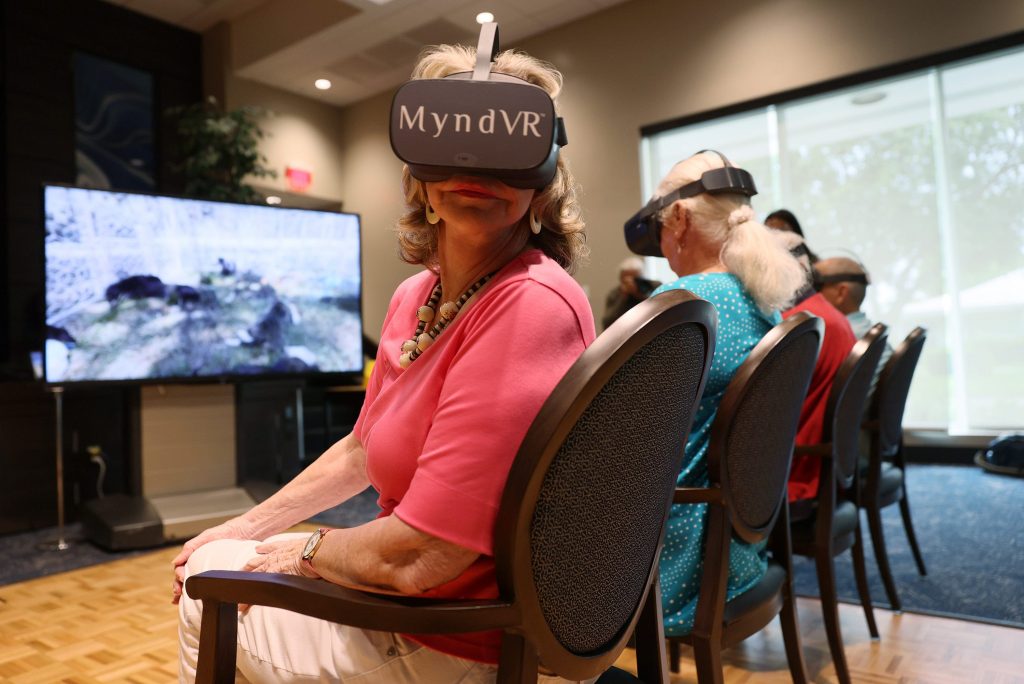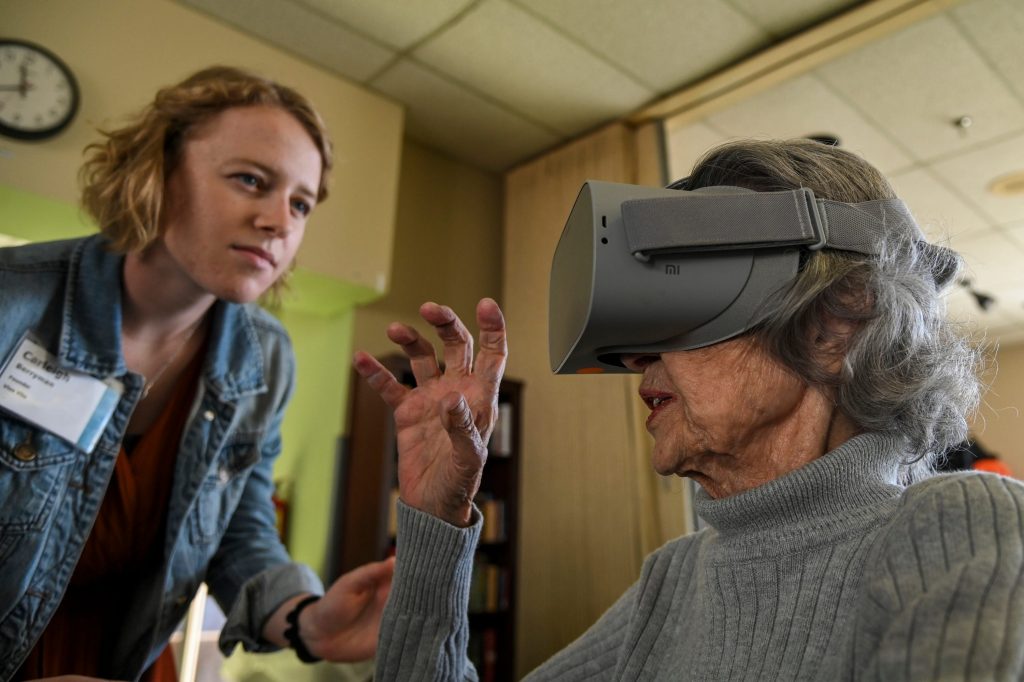- Researchers at a South by Southwest panel suggested that virtual reality could help treat or ward off Alzheimer's.
- The technology could reduce loneliness, a key risk factor for Alzheimer's.
- It could also trigger old memories or help people recall a family member's voice.
After decades of failed research, scientists are zeroing in on new methods to prevent or slow the progression of Alzheimer's disease.
Some of these treatments don't involve pills or injections. At a South by Southwest panel in Austin, Texas, on Saturday, researchers suggested that virtual reality could help combat feelings of loneliness and social isolation — two factors closely linked to Alzheimer's.
Exposing people with Alzheimer's to virtual reality could also trigger certain memories they once lost or help them recall specific senses, like the sound of a family member's voice. A small study from the University of Kent in the UK found that virtual reality could help people with dementia — the loss of memory, language, or reasoning skills often caused by Alzheimer's — recall old memories.
"That sort of reminiscence, it doesn't necessarily reverse dementia, but it can certainly slow the progression," Allison Sekuler, vice president of research at Baycrest Health Sciences, said at the SXSW panel.
"It's not just making people happy and less lonely," she said, adding, "It's actually helping the brain."
Virtual reality could reduce loneliness, a key risk factor for Alzheimer's

Older adults face an increased risk of loneliness due to a number of factors. Many live in long-term care facilities, far away from friends and family. Some may have lost a spouse, their children may have grown up and left the house, or they might have a disability or illness that keeps them homebound.
"People didn't used to think about loneliness as a risk factor for disease," Sekuler said. But loneliness is now comparable to heart disease or smoking in terms of its long-term health consequences, she added.
Social isolation among older adults was associated with a 50% increased risk of dementia, according to a 2020 report from the National Academies of Sciences, Engineering, and Medicine. A 2021 study from Boston University also found that persistent loneliness in mid-life (between ages 45-64) made people more likely to develop dementia and Alzheimer's later on.
The pandemic has worsened the problem: More than one-third of Americans in a Harvard University survey reported "serious loneliness" as of October 2020, meaning they were frequently, usually, or always lonely in the prior four weeks.
Sekuler said the world could see a "doubling down" of neurodegeneration as a result of COVID-19.
Virtual reality is better for brain function than a phone or Zoom call
Virtual reality could help connect people to their loved ones, even when they can't be in the same room. A technology company called MyndVR, for instance, lets older adults share their virtual reality screens with friends or family around the world.
"It's not a Zoom call. It's not two-dimensional. You're in a Grand Canyon scene with a loved one who's talking to you and she can see it on her phone in New York and guide what videos are next," Chris Brickler, the company's CEO, said on Saturday.

Researchers on the panel agreed that there's a difference between talking on the phone and experiencing a three-dimensional environment with new sights, sounds, and — in, some cases — even smells.
"If we're just looking at a tablet or a smartphone or a television set, we're not really there in terms of full activation of our brain and our emotions," said Walter Greenleaf, a neuroscientist at Stanford University.
By contrast, Sekuler said, "there's actually changes in the brain function when you're in VR, versus listening to someone on the phone or looking at a screen."
'We're moving to the era of prescription digital medicines'
Drug trials tried and failed for decades to produce treatments that would stop the progression of Alzheimer's, and several large pharmaceutical companies abandoned the mission of developing Alzheimer's treatments altogether.
Then in June of last year, the Food and Drug Administration approved the first new Alzheimer's drug in nearly 20 years, an antibody infusion called Aduhelm. The drug's approval quickly became controversial. Many scientists questioned whether Aduhelm warranted the FDA's green light, since it didn't definitively improve memory or cognition in clinical trials.
A few other antibody drugs have shown promise, but none has been approved to treat Alzheimer's yet.
Virtual reality could start to fill gap in Alzheimer's therapy. Last week, four members of Congress introduced a bipartisan bill that would allow Medicare to cover software-based treatments, such as virtual reality, for disease.
"We're moving to the era of prescription digital medicines, which is incredible," Greenleaf said.










